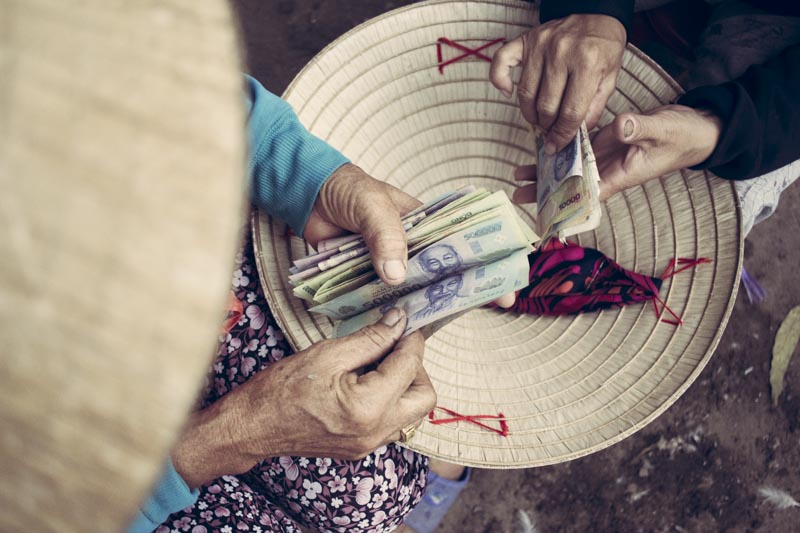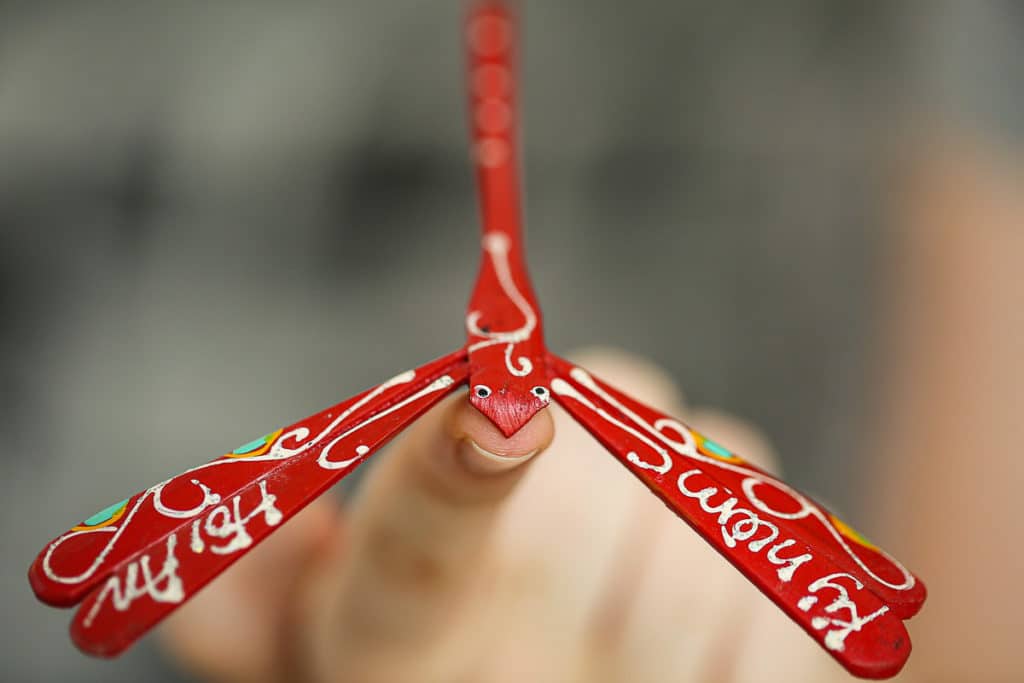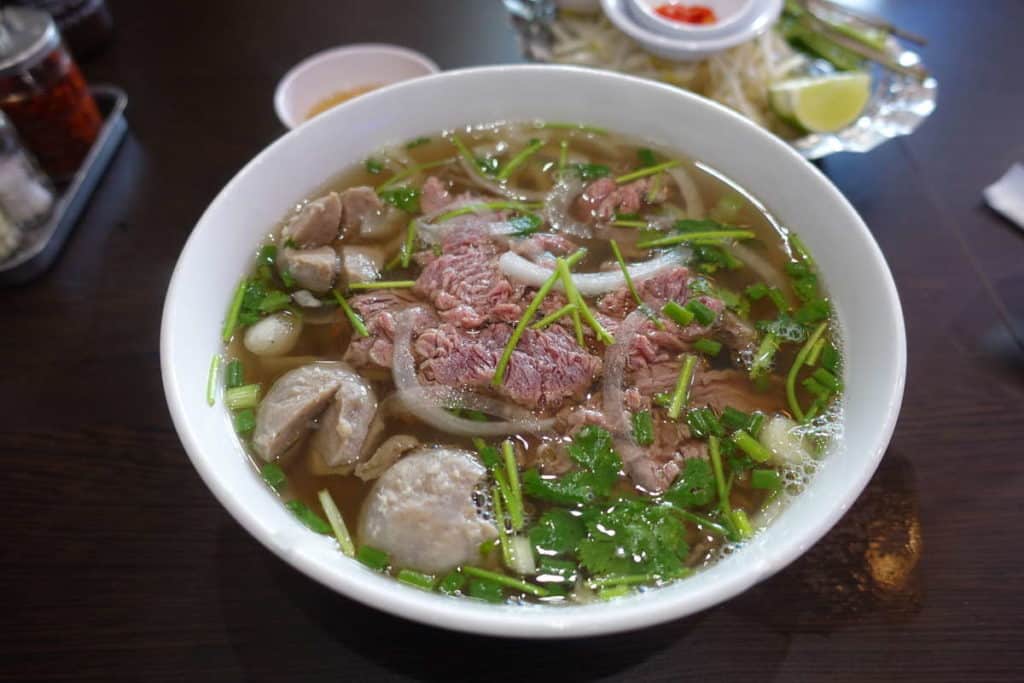As with any tourist hotspot, you may find prices in Hoi An a little higher than in other parts of Vietnam. However, as prices go, Hoi An is still incredibly cheap.

Vietnam is a country where negotiation (or barter) is normal practice. For many tourists, this causes frustration as we are used to having price tags on everything. To this end, here is a very basic price guide for common items around Hoi An. Keep in mind that prices will likely be more expensive at hotels, resorts, and in the heart of Hoi An Ancient Town.
Prices for Basic Items in Hoi An
Prices given below are approximates and may vary, particularly in places where there is no set price.
Travel
Taxi (Hoi An Old Town – Beach): 80,000 – 100,000 VND
Hire a Car/Driver (Hoi An – Da Nang, one way): 250,000 VND
Motorbike Hire: 80,000 – 100,000 VND per day
Taxi (Hoi An – Da Nang, one way): 450,000 VND
Petrol to Fill up Motorbike Tank: 60,000 – 90,000 VND
General Items
Raincoat/poncho: 10,000 vnd – 15,000 VND
English language newspaper: 40,000 VND
Flip Flops: 40,000 – 80,000 VND
Tiger Balm: 20,000 – 30,000 VND
Food and Drink
Water: 7 – 10,000 vnd – 15,000 VND
Banh Mi: 20,000 – 40,000 VND
Beer: 15,000 or 20,000 VND
Soft drinks: 10,000 VND – 20,000 VND
Bowl of Pho: 30,000 – 50,000 VND
Quail Eggs: 20,000 VND per bag
Peanuts: 10,000 VND per bag
Drip Coffee Filter: 20,000 VND + small coffee bag 30,000 VND


Souvenirs
Conical Hat: 30,000 – 40,000 VND
Sunglasses: 80,000 – 100,000 VND
Fans: 50,000 – 70,000 VND
Bamboo Dragon Fly: 30,000 – 40,000 VND
Souvenir T-shirts: 80,000 – 140,000 VND
Alibaba Trousers: 80,000 – 150,000 VND
Chopsticks: 70,000 – 200,000 VND
Lantern (medium size): 50,000 – 80,000 VND
For more prices see What to Buy in Vietnam
Market Prices with Miss Ha – Videos
Want to know what you should pay for street food or at the markets? Check out our videos below.
Bartering
‘I hate bartering, life would be so much easier if prices were listed.”
“I just feel everyone’s out to rip me off.”
These are frequent complaints from tourists and expats. But here’s the thing, bartering is an intrinsic part of Vietnamese culture. A friend in Hue once told me her mother went to the same fruit seller for 30 years. They were friends and even though they both knew the prices they bartered every day as if they’d just met for the first time. To learn how to haggle like a pro, just keep reading….
Do
- Smile, engage in conversation and be pleasant with the seller, they are only trying to make a living after all.
- Begin bartering at 60-65% of the original asking price. Sellers are aware that tourists are far more savvy these days so prices aren’t as inflated as you may think.
- Have a rough idea how much you want to spend and what your limit is.
- Go up in small increments – depending on the original price.
- Enjoy the experience, this really is part of the culture here so soak it all in!
- Remember that some of these people really do make very little money and have families to support, don’t be stingy; come to an agreement that is good for both parties.
Don’t
- Be ostentatious; keep flashy jewelry and designer clothes to a minimum. If not the seller WILL over-inflate the price.
- Ask out of curiosity, nothing frustrates a seller more than a person asking and just walking away without even trying to make a deal. Browsing doesn’t really exist here!
- Get defensive or aggressive. It’s nothing personal, just business and part of the culture in Vietnam.
- Argue over small change.
- Walk away and expect the seller to accept your price. More and more, they won’t.
- Engage in a lengthy battle just to walk away empty handed, its fun to barter but don’t waste your time and theirs. You can almost always come to some agreement.
Little Bit of Insight
Most shop-sellers work very, very hard, for long hours, seven days a week. They do not earn a lot of money and life can be really, really tough in low seasons. Shop-sellers are usually very nice people. From their point of view they cannot understand why foreigners haggle over small amounts of money like 10,000 VND when we have so much more than them.
Thank you for this great page! Like most westerners I hate haggling, as a kid I loved it because I would ‘win’ by getting lower and lower prices because it was a game but as an adult you understand that it’s people’s living and it stress me out not wanting to rip people off but not wanting to get ripped of in return, so it’s very helpful to have a range of reasonable prices to go off
Such a comprehensive list with a lovely way of looking at the bartering system.
I went to India a few years ago and an old gent had a cyclo rickshaw and offered a price for a trip. I was mid barter (and very new to it!), when a local kid walked by and said ‘He’s very old. he lives off fruit. He only needs to do one ride a day to live his simple life. You are asking too much and being unkind’.
I felt ashamed and embarrassed and ever since then I make sure to find out the going rate and pay it, rather than see it as winning or losing.
We’ve all got to eat and it really put things into perspective for me